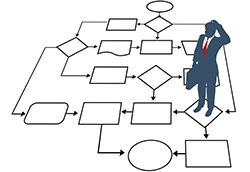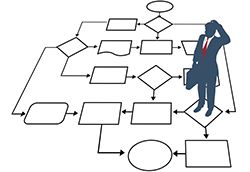Don’t Be a Victim, Break the Rules
“You are remembered for the rules you break.”
Douglas MacArthur
 Anyone who has studied the history of medicine will notice that some of our biggest breakthroughs have been the result of a single scientist breaking the rules. History tells us these are the same people who have also effectively changed a conventional paradigm. For example, the world is flat, wash your hands, earth revolves around the sun. Often times, the rule-breaking scientist pays a considerable price for being a change agent. The pain of change forces an outlandish idea to become a piece of conventional wisdom.
Anyone who has studied the history of medicine will notice that some of our biggest breakthroughs have been the result of a single scientist breaking the rules. History tells us these are the same people who have also effectively changed a conventional paradigm. For example, the world is flat, wash your hands, earth revolves around the sun. Often times, the rule-breaking scientist pays a considerable price for being a change agent. The pain of change forces an outlandish idea to become a piece of conventional wisdom.
Even in the social sciences, we often see rule breaking as a means to progress and enlightenment. Just look at Rosa Parks and others like her during the Civil Rights Movement. Nelson Mandela in the face of Apartheid. Ronald Reagan challenge to Gorbachev to tear the wall down.
We face outlandish ideas (rules) in the work place all the time. One popular one is “this is the way we have always done it.” How many times have we heard that? Breaking this single rule can often yield great rewards in professional wisdom and in productivity. In our often over-stimulated, over-technical workplace environment, we often find ourselves powerless in the face of bureaucratic electronic fences and complexity. It is easy to get overwhelmed, easy to submit to the way we have always done things. I have found in my career that people often follow rules simply because of inertia or because no one is measuring outcomes in a meaningful way.
When we measure our outcomes and keep score during our work it becomes increasingly more difficult to utilize flawed logic or to cling to the way we have always done it. It forces us to break the rules. It forces us to stop being victims to the mindless way in which we often work.
Often when we are executing projects the biggest operating constraints are the rules established by the firm. Many times these rules are really just old habits and typically they have no logical, timely or relevant basis other than “this how we have always done it.” Many firms cannot let go of their stodgy industrial mindsets and cultures (even though most of them have been hard at work in a knowledge economy for quite a long time now). The firms brave enough to break the rules are truly emerging and re-emerging, boosting productivity, increasing effectiveness and accelerating execution speed.
This week examine your daily routine and ask yourself what rules could I break? When running a project, challenge yourself to play the curious anthropologist— ask why you do what you do. The movie Office Space was infamous for outlining the ludicrousness of the TPS reports. My guess is that you have your own TPS reports in your organization. The bottom line is simple: If the rule is not adding value or making life better for someone it probably should be broken.
Don’t forget to leave your comments below.


 The result is a room full of people, all of whom are multitasking and moving between the past (what happened yesterday) and the future (what will happen tomorrow) often missing the most important information (which was the point of coming together to the meeting in the first place). I have laughed out loud viewing online parodies of the types of meetings we all attend all the time. The reason they are so funny is because they are so true. It is very easy to become the parody, especially as technology enables this pattern and the speed that comes from the technology creates a social expectation that encourages it.
The result is a room full of people, all of whom are multitasking and moving between the past (what happened yesterday) and the future (what will happen tomorrow) often missing the most important information (which was the point of coming together to the meeting in the first place). I have laughed out loud viewing online parodies of the types of meetings we all attend all the time. The reason they are so funny is because they are so true. It is very easy to become the parody, especially as technology enables this pattern and the speed that comes from the technology creates a social expectation that encourages it.
